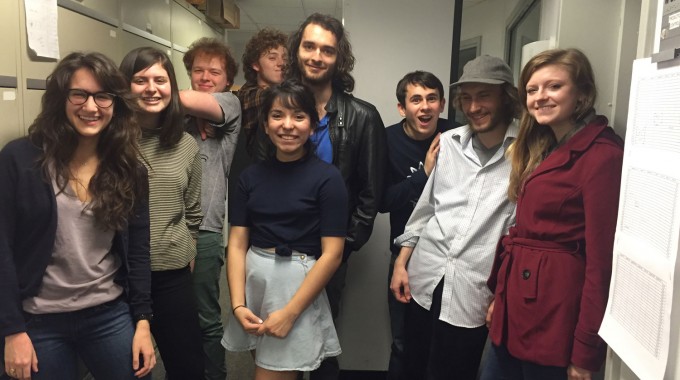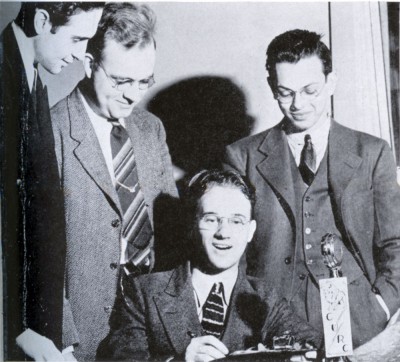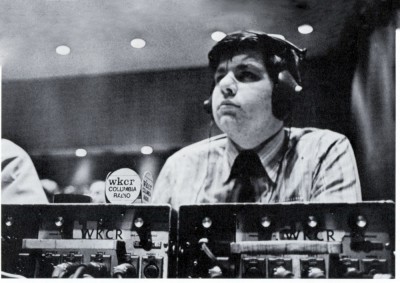If you know of a Columbia College student, faculty member, alumnus/alumna or program we should spotlight, or if you would like to submit a story, please contact:
Columbia College
Office of Communications
cc-comms@columbia.edu

“That’s what I think is the most beautiful thing about KCR — it’s a constant process of education and spreading knowledge and sharing alternative music.” — Cooper Lynn CC’17
FM radio was pioneered on Columbia’s campus in 1939 by Professor Edwin H. Armstrong. According to University legend, the radio station that first began in a single in Columbia’s John Jay Hall is known as “The Original FM.”
Now broadcast from a studio custom-built by the University and transmitted from an antenna on the top of 4 Times Square, much has changed since the 1941 beginnings of King’s Crown Radio (known as WKCR on air, KCR colloquially). What began as a station dedicated to classical music and intellectual, social and political broadcasts — the station famously recorded the transmission of the Soviet Union’s Sputnik when it crossed the United States — has become an entity deserving of its moniker, “The Alternative.”
 WKCR, which originated as the Columbia University Radio Club, in 1941. Photo: Courtesy Columbia College Today
WKCR, which originated as the Columbia University Radio Club, in 1941. Photo: Courtesy Columbia College Today
WKCR, which celebrated its 75th anniversary in 2016, owes this distinction in large part to the role it played in making heard the voices of the 1960s student protests on Columbia’s campus. “After 1968 [the station] decided it could not go back to just the way things were,” says Cooper Lynn CC’17, WKCR’s former business manager. “They decided to remain socially conscious. They decided the focus would be on jazz and they would be representing the music of African-American and minority communities in New York City.”
This new mission transformed the traditional radio station into one that works tirelessly to make heard the “voices in music that are normally ignored,” former station manager Elisabeth Stam BC’16 explains, while continuing to provide classical music and intellectual and political content.
WKCR’s mission calls for a space dedicated not only to lesser-known contemporary voices in music (and jazz specifically) but also to the voices of music history that might otherwise be forgotten. In a world of Apple Music, iTunes, and Spotify, WKCR’s dedication to preserving music history demands more than simply broadcasting older pieces: it gives music history a physical presence on Broadway and 114th street, with a studio that houses a library stacked floor-to-ceiling with CDs, LPs and reel-to-reel tapes.
“We have an enormous amount of really crazy and rare reel-to-reels that deserve to be listened to and deserved to be played,” says Lynn. “Mp3 files are just not as good as CDs or LPs. That’s something we pride ourselves on, both in terms of content and in terms of medium.”
Playing everything from Coltrane to cantatas, WKCR’s goal of preserving thousands of years of music requires a respect for music that transcends the personal aesthetic of its programmers — radio programmers who put together and present WKCR’s shows live on air — all of whom are Columbia University students or alumni.
“It’s a little more complicated than, ‘Do I like this music I’m playing on here?’” says Lynn. “It’s, ‘Is this music important, and how can I balance that with the music I enjoy?’”
When a student first decides to become a programmer, he or she shadows a current programmer for a semester, undergoing rigorous technical training and attending WKCR-run classes on everything from aesthetics to studio equipment, a process that culminates with two exams.
 A WKCR programmer in 1971. Photo: Courtesy Columbia College Today
A WKCR programmer in 1971. Photo: Courtesy Columbia College Today
WKCR emphasizes to its programmers the importance of openness for its mission. “When you try to allow for underrepresented or ignored or forgotten voices in music you have to be open-minded,” says Stam. “That’s how you find them.”
This holds true for WKCR’s mission to preserve music history, but it is perhaps even more apt for the second part of WKCR’s mission: to curate unknown voices in today’s music, an ongoing project for all of WKCR’s programmers.
“Oftentimes I’m a programmer for new music,” says Program Director Jasper Hussong CC’18. “[New music] is a sort of avant-garde music from the twentieth or twenty-first century generally ... and when people call in, it will be probably [be] a complaint, ‘Why are you playing this?’ ... It’s oftentimes fun for me to have a discussion with them on the phone about why they don’t like it or to explain why I like it.”
This opens up a space “for the great musicians out there right now who are completely overlooked in terms of popular music” explains Lynn. “You’re not going to hear modern music on KCR that you could go into a store and hear playing over a PA. You’re going to hear music that you have to go out to the middle of Queens to hear in this underground bar where someone is pouring their heart out.”
WKCR’s dedicated programmers are the ones who go out across the five boroughs and find this music. Entirely student-run under the supervision of its advisor, Philip Masciantonio, 10 students head WKCR’s nine different departments — American, Arts, Classical, In All Languages, Jazz, Latin, New Music, News and Sports. Every student in WKCR’s leadership, along with countless other student and alumni programmers, also programs at least one show.
“We welcome everyone,” says Stam. “If you’re interested in what we do, we’re interested in having you be a part of it.” WKCR’s programmers are serious and passionate about what they do, so much so that it is common practice for WKCR alumni visiting the city to stop by the studio and guest-program a show.
“Our alums provide us with knowledge about WKCR's rich history, and they remind us about what the station has meant to Columbia and the New York City area for the past 75 years. They've seen WKCR evolve over the years ... so the advice they give us is invaluable,” says Claire Berner BC’17, WKCR’s 2016 station manager. “Also, our alums are an extremely well-connected bunch. Many of them are still in the broadcasting or music industries, so current programmers can get a glimpse of these lines of work should they choose to pursue them.”
WKCR programmers not only live-broadcast shows, they also curate the music. The programmers come together at listening sessions where they showcase new music they have found for the other programmers or discuss older music they are interested in.
“One of the programmers might say, ‘Listen, I just went out and listened to this guy; let me show you some of his work. And suddenly you’ve got five other people who are listening to this — five other people who have got shows on KCR who now will play his music,” said Lynn. “That’s what I think is the most beautiful thing about KCR — it’s a constant process of education and spreading knowledge and sharing alternative music.”
Hussong says that being a programmer is very much about sharing this dynamic with the audience. “It can be fun to open new avenues for people who might not appreciate certain music at first…. We are curating the culture and what currently matters in society as well as perpetuating music from previous times, like jazz and classical music.”
Lynn even relates this work to the College’s Core Curriculum. “I think we are actually heavily indebted to the Core…. Everybody is listening to Katy Perry. Everyone already knows that Joni Mitchell is great. Everybody has already listened to ‘Here Comes the Sun,’ and, you know, ‘Mr. Tambourine Man’. So we don’t need to present that ideology anymore,” says Lynn. “What we need to present is the alternative ideology, and give voice to another subset of our society. …That’s I think what the Core is doing: …putting these texts in conversation with each other across huge swathes of time, in order to present different ideas on what reality can be….”
“The most important thing that you can have is dialogue,” says Lynn. “We’re trying to present alternative viewpoints — viewpoints that are absolutely necessary if we’re going to improve where we are.”
By Sally Whalen CC’17